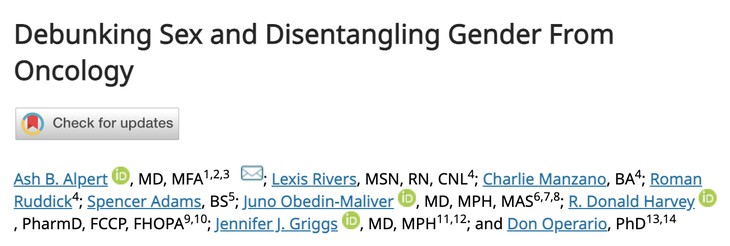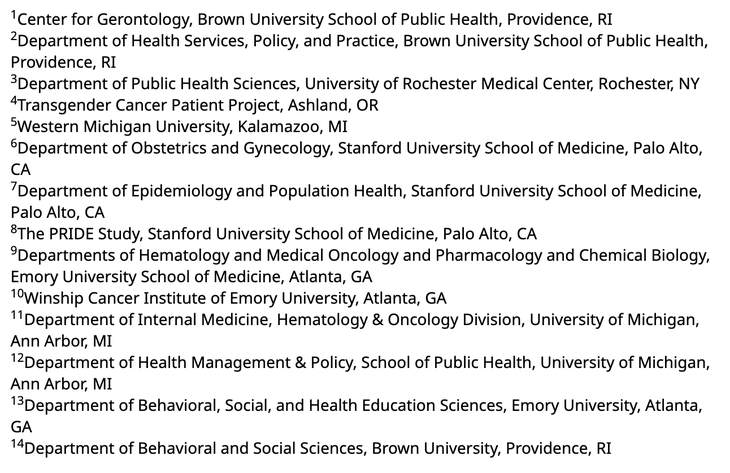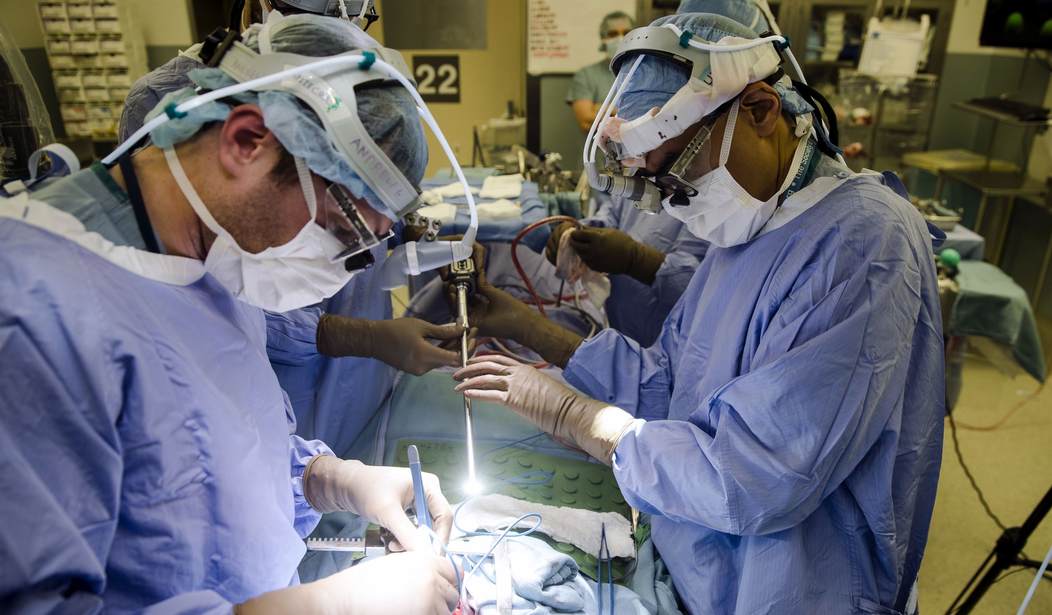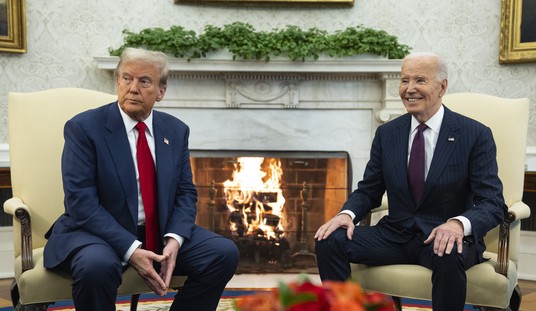A spectre is haunting oncology — the spectre of ontological oppression. All the powers of old biology have entered into a holy alliance to exorcise this spectre: medical doctors and researchers, scientists and patients, surgeons and radiologists.
Sorry, I couldn’t resist paraphrasing the opening to The Communist Manifesto. It is one of my many flaws stemming from my academic background.
I chose to open with a paraphrase of the Communist Manifesto because it is communists who are attaining the commanding heights of our culture. Many people used to assume that it was the humanities and the “soft” sciences that were vulnerable to the danger, but I for one always knew that it was only a matter of time before the harder sciences would be destroyed by Leftist drivel.
Leftism is not a social theory, but a theory of Being itself. It is comprehensive in scope, meaning that there is no aspect of the universe that is not understood through its lens.
This is how you get this: a group of oncologists–doctors who study and treat cancer–declaring that oncology as a discipline is fundamentally oppressive because it distinguishes between types of bodies. Making such judgments is by its very nature oppressive by wiping away the self-image of others.

Lest you think the authors are all liberal arts weinies, let me share with you their credentials. The authors are from some of the finest medical institutions in the land.

Brown University School of Public Health. University of Rochester Medical Center. Stanford University School of Medicine. Emory University School of Medicine. University of Michigan.
These are medical professionals who treat patients, teach those who do, and who design public health policies. And they actually published this:
Ontological OppressionThe construction of otherness because of assumptions about personhood—otherwise known as ontological oppression1—excludes or misrepresents bodies or identities on the basis of preset categories. Ontologic constructs of gender in oncology encompass the notions that gender is inseparable from and synonymous with sex assigned at birth (henceforth sex), that gender is a static social concept across history or a fixed identity across the personal life course, and that sex is an objective and fixed category that can be easily assessed by a clinician. In addition to sex being conflated with gender, sex is used to make assumptions about a person’s anatomy, chromosomes, and/or endogenous hormones.2 The presence of transgender and intersex people therefore challenges unquestioned assumptions and conflated concepts that are pervasive in medicine and particularly salient in oncology for several reasons. First, discourses regarding specific cancers (eg, ovarian, endometrial, prostate) are often conflated with gender. Second, cancer epidemiology is often linked to a conflated sex/gender marker (eg, breast cancer incidence described specifically for women or men). Third, oncology subspecialty care is often gendered, and in the context of cancer treatment, occupying exclusively gendered spaces may be particularly painful. Last, mistakes regarding laboratory values or chemotherapeutic dosing may be particularly hazardous.
This is, of course, complete and utter nonsense. Worse, it is very dangerous nonsense, as there have been plenty of cases, particularly in emergency care, where confusion about sex has cost lives or harmed people. A bearded person whose pregnancy crisis was misdiagnosed due to the apparent maleness of the patient, for instance. Insisting one is a man in a medical crisis is idiotic, but when one’s ontology (how one interprets the world) insists on maintaining obvious fictions, such things are going to happen.
For God’s sake, when lives are at stake can you stick to reality?
No. No, they can’t. Because their view of “reality” is fundamentally skewed by an ideology. They literally believe reality bends to our will.
Conflated conceptions of bodies and selfhood are interwoven throughout oncology training, algorithms, and epidemiological and other biomedical analyses. Cancer epidemiology (eg, women have higher rates of cholangiocarcinoma than men), differential diagnoses, and many other core aspects of oncology rely on conflated concepts of gender and anatomy. These conflations render invisible and pathologic transgender and intersex people whose anatomy, chromosomes, or hormones do not match categorical expectations. Such ontological oppression has many consequences including stigma and substandard care. This analytic essay, authored by queer and transgender academic clinicians, researchers, nonacademic community members, and allies, proposes a systems-based approach to degendering oncology, which we define as the conscious and explicit disentangling of gender, anatomy, hormonal milieu, karyotype and other biological factors in oncologic diagnoses, epidemiological analysis, and knowledge production along with eliminating sex from our conceptual framework of bodies and disease. We provide examples of the implementation of degendering oncology, including steps that can be taken immediately by clinicians, researchers, and administrators.
We keep on being told that humoring transgender people is simply a matter of compassion. Even if we are acknowledging a personal delusion, what harm could it possibly do?
“Leave us alone” is all they ask.
No, no it isn’t. If that were the case then there would be no problem.
But because transgender ideology is not about self-image, but about the actual functioning of the world, it makes demands upon everybody to acknowledge “facts” that are simply not true.
This has happened in the past. Soviet agronomist Trofim Denisovich Lysenko became Stalin’s favorite scientist because he insisted that just as communism could build a new Soviet Man divorced from human nature and culture, plants could be trained in the same way to escape genetics and become new glorious food sources by, essentially, force of will.
A famine followed, and the term “Lysenkoism” was born: science driven by ideology instead of the scientific method. You find it everywhere these days.
There are important projects for oncologists to tackle, pretty much of which have to do with the prevention and cure of cancer. And none of which have to do with “Ontological Oppression.” If doctors refused to treat people for being transgender that would be hideously unethical; doctors refusing to accept biology would be disastrous.
Yet that is what is being demanded–the deconstruction of biology and reinterpretation of everything biological to fit the self-image of insane people. It is the same impulse behind “healthy at any size,” which is also a manifestly untrue assertion that has gained cultural heft.
Some cases of what I can *say* I am:
Omnipotent
A window frame
an ink dot
Uruguay
The present King of France
The Absolute Idea
Immortal
A pebble
My brother
140 (years old)
140 (the number)
140 (feet tall)
femaleTo talk about a right *to be* any of these is nuts.
— Jon Pike (@runthinkwrite) June 1, 2023
The world simply is as it is. We can learn about how it works and how to manipulate it to get better outcomes for human beings, but that is not making nature bend to our will, but learning the tricks of how it works to make outcomes more desirable for us.
That is not good enough for people who demand to live in a fantasy world. These people truly believe, it seems, that calling a dog a unicorn makes it so.
We may not be able to shake them of their dangerous delusions, but we can reject them. And yet even our medical elite refuse to do so.
At the root of all this is, of course, a desire for power. Once you disconnect people from reality you can convince them of anything, and that really is the point. If you can force people to deny the evidence they see before them, what can’t you force them to do?
Look around you and witness what COVID gaslighting did. It convinced most of the world to do the most insane things and attack others who refused to comply.
In a sane world even appending one’s name to such an article would be grounds for dismissal. In our world, it will be a badge of honor.








Join the conversation as a VIP Member